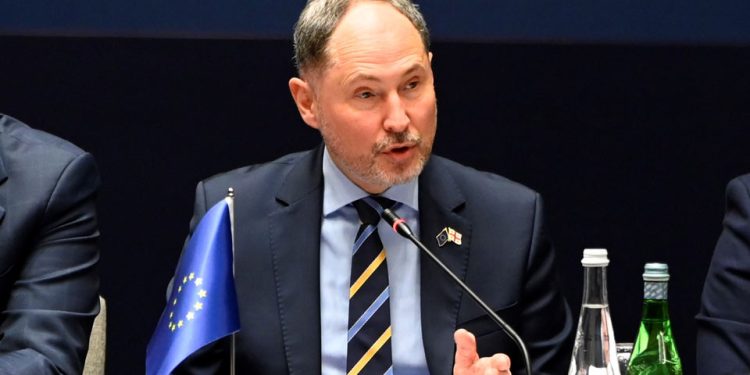Georgian, Azerbaijani, Romanian, and Hungarian officials gathered in the Georgian capital Tbilisi on April 7 to discuss various stages of the implementation of the Black Sea submarine electricity cable project, a new transmission route to deliver green energy from Azerbaijan to Europe.
Georgian Economy Minister Levan Davitashvili delivered the preliminary findings of the project’s feasibility study and reviewed the next steps in its execution. He noted that preliminary technical surveys on the Black Sea Submarine Cable Project showed that it would be successfully implemented.
State Secretary in the Romanian Ministry of Energy, George Niculescu, said he believes “this project represents an opportunity for the countries located in the Caspian Sea, as well as for those in Europe, to be better interconnected in exchanging renewable energy through this cable.”
Hungarian Minister of Foreign Affairs and Trade, Peter Siarto, noted that they “are looking for diversification, we are looking for green solutions as well as environmentally friendly solutions, therefore, this project is of crucial importance for us because, in the long term, it can ensure the security of a supply of electricity to Hungary.”
EU Ambassador to Georgia, Pavel Herczynski, pledged that “as the European Union, we are firmly behind this project. We want this project to have a regional dimension and we sincerely hope that in several years, South Caucasus will become a very important source of energy to the EU.”
The Black Sea submarine cable project will be implemented with the support of the Georgian government and the cooperation of the Georgian and Romanian transmission system operators “Georgian State Electric System” and “Transelectrica”. On December 17, 2022, a strategic cooperation agreement was signed between the governments of the Republic of Azerbaijan, Georgia, Romania and Hungary on the development and transmission of green energy. One of the important issues of the agreement was the Black Sea submarine cable project – once the project is implemented, a 1,195-kilometer cable will be connected to Romania (1,100 km underwater and 95 km land cable), which will allow the countries of the South Caucasus and Romania to take advantage of the expanded export opportunities and conduct trade, taking into account the hourly prices of the electricity market.
At this stage, “Georgian State Electric System” consulting company CESI is carrying out a technical-economic study of the project. In the future, within the framework of the project, environmental and social impact assessment and geophysical and geotechnical studies of the Black Sea bed will also be carried out. Through them, the possibilities and best ways of practical implementation of the project will be determined.














